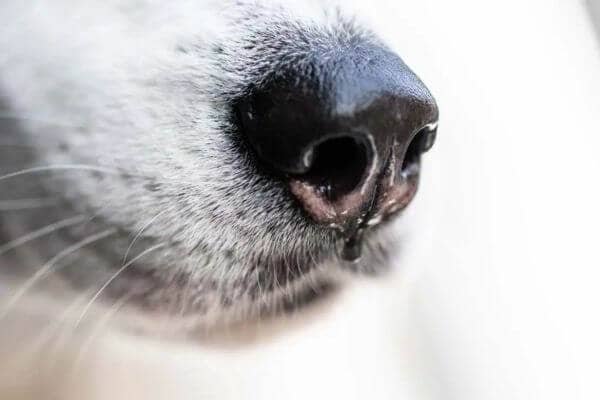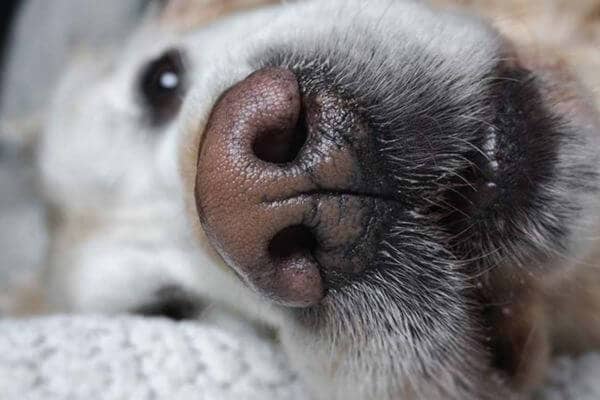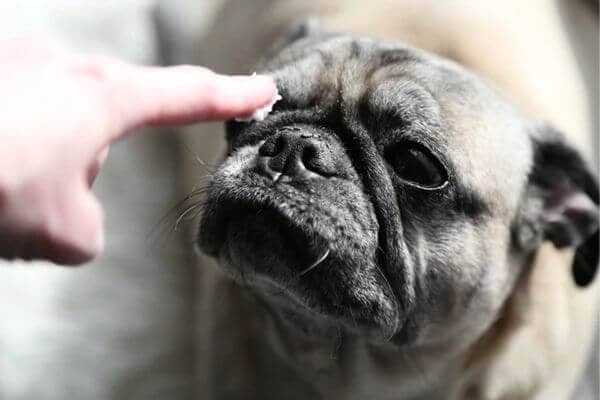Why are dog nose wet? According to studies, approximately 80% of a dog’s nose comprises mucus-producing cells contributing to its wetness. This exciting statistic sheds light on why dog noses are wet.
A critical function of the mucus in a dog’s nose is to enhance their sense of smell. The moisture helps to capture scent particles in the air, allowing dogs to detect even the faintest odors.
Additionally, the wetness serves as a cooling mechanism for these furry companions. Dogs do not have sweat glands like humans; hence, they rely on their moist noses to regulate body temperature.
Keeping the nose clean and healthy is another reason dogs have wet noses. The moisture helps trap dirt and debris while lubricating sensitive nasal passages.
Understanding why dog noses are wet satisfies our curiosity and highlights the incredible physiological adaptations that enable these animals to navigate their world through scent.
Key Takeaways
- Dog noses are wet because of the mucus-producing cells comprising 80% of their nose. The wetness is important for their sense of smell and helps them trap and detect scents.
- A wet nose also helps dogs regulate their body temperature through evaporation and conduction. It aids in dissipating heat and maintaining their internal temperature.
- The wetness of a dog’s nose serves as a communication tool among canines, helping them communicate with other dogs and humans through scent molecules in the air.
- Proper hygiene and regular cleaning of a dog’s wet nose are crucial for optimal functionality and overall nose health. It prevents infections, removes dirt and debris, and ensures the nose remains clean and healthy.
The Role of Mucus in a Dog’s Nose
The mucus in a dog’s nose serves a crucial physiological function that contributes to their overall olfactory capabilities. Mucus production plays a vital role in protection, as it helps filter and trap foreign particles, such as dust, pollen, or bacteria, that may enter the nasal cavity during sniffing activities.
The sticky nature of mucus allows it to capture these particles before they can reach the sensitive respiratory system. Additionally, mucus provides moisture to the nasal passages, preventing them from drying out and maintaining optimal conditions for scent detection.

This moisture also enhances the dissolving and transport of odor molecules to the olfactory receptors in the nasal epithelium. Therefore, dog noses wet are an essential adaptation that aids in their ability to detect and analyze various scents efficiently.
Enhanced Sense of Smell
Enhanced olfactory abilities in canines are associated with the moistness of their nasal surfaces. This moisture is crucial in enhancing a dog’s sense of smell. Here are three reasons why a wet nose contributes to dogs’ remarkable scent discrimination:
- Increased surface area: The moisture on the nasal surfaces helps to trap odor molecules, creating a larger surface area for the olfactory receptors to detect scents effectively.
- Improved signal transmission: The thin layer of mucus on the nose helps to dissolve odor molecules and facilitates their interaction with the olfactory receptors, ensuring efficient signal transmission to the brain.
- Odor capture and analysis: The moistness of a dog’s nose aids in capturing and retaining scent particles, allowing for prolonged analysis by specialized cells in their noses. This extended exposure time enables dogs to discern various scents and determine their specific details.
Understanding how dogs’ wet noses contribute to their enhanced sense of smell highlights their remarkable capabilities in scent discrimination.
Why are Dog Nose Wet? Cooling Mechanism
Cooling canines cleverly control core body temperature through a cunning combination of convection and conduction.
Dogs have sweat glands, but unlike humans, they are not primarily located on their noses. Instead, dogs rely on evaporation to cool down. When dogs pant, moisture from their respiratory system is expelled through their open mouths. As this moisture evaporates from the wet surface of their nose and tongue, it helps to dissipate heat from their bodies.

The large surface area of a dog nose allows for efficient evaporation and aids in the cooling process. Additionally, the coolness of a dog’s wet nose helps to regulate its internal body temperature by transferring heat away through conduction when it comes into contact with cooler surfaces or objects.
Communication Tool
One method employed by canines to facilitate communication is using their highly sensitive sense of smell. Dogs can detect and interpret scents, allowing them to communicate with other dogs and humans. Their wet noses are crucial in this process as they enhance their olfactory capabilities.
Dogs can convey information about their intentions, emotions, and health status through nonverbal cues and olfactory signals. This enables them to establish social bonds, assert dominance or submission, mark territories, and identify individuals or objects. The wetness of a dog’s nose helps trap scent molecules in the air, increasing the chances of capturing important information for communication purposes.
Understanding canine behavior is essential for those who desire to serve dogs effectively.
Emotional Response:
- Fascination: Discovering the intricate world of canine communication can be awe-inspiring.
- Empathy: Realizing that dogs rely heavily on nonverbal cues highlights our responsibility to understand and respond to their needs.
- Connection: Recognizing that we can engage with our furry companions more deeply creates a sense of closeness and mutual understanding.
Keeping the Nose Clean and Healthy
Maintaining the cleanliness and hygiene of a dog’s olfactory organs is crucial for ensuring optimal functionality and preventing potential health issues. Proper nose hygiene involves regular cleaning to remove dirt, debris, and excess moisture that can accumulate on the surface.
This helps to prevent infections and keep the nose healthy. Dog wet noses primarily due to the presence of mucus secreted by specialized glands in their nasal passages. The moisture aids in capturing scent particles from the environment, enhancing their ability to detect smells effectively. However, excessive wetness can lead to bacterial or fungal growth, causing infections or irritation.

Regularly wiping the nose with a clean cloth dampened with warm water can help maintain its cleanliness while avoiding excessive dryness or irritation. Additionally, veterinarian-approved products designed for canine nasal care can provide extra protection against potential infections.
| Pros | Cons |
|---|---|
| Prevents infections | Excessive dryness |
| Maintains cleanliness | Potential irritation |
| Enhances scent detection capability | Requires regular maintenance |
| promotes overall nose health | Need for veterinarian-approved products |
| Improves comfort for dogs | Careful handling is required during cleaning |
Following proper nose hygiene practices, pet owners can contribute to their dog’s well-being by keeping their noses clean and healthy.
Conclusion
In conclusion, dogs have wet noses for several reasons. The moisture enhances their sense of smell, helps regulate body temperature, serves as a communication tool, and aids in keeping the nose clean and healthy. The mucus-producing cells in a dog’s nose play a crucial role in capturing scents and maintaining optimal nasal function.
Understanding why dogs’ noses are wet sheds light on the remarkable adaptations that allow them to navigate their world through scent. So, the next time you encounter a wet-nosed pup, you’ll have a deeper appreciation for the science behind this fascinating canine characteristic.
“If you can’t find the right dog to adopt locally, please consider adopting one from Bone Voyage Dog Rescue. We’ll fly with your dog to you.”
SEE ALSO:
- The Possibility of Dogs Being Autistic
- How to Stop Puppies from Biting and Chewing
- Why Does Dog Lick My Feet
- Do Dogs Wag Their Tails
- Why Is My Dog Coughing
Frequently Asked Questions
Can a dog’s wet nose indicate illness or health issues?
A dog’s wet nose can indicate illness or health issues, such as allergies or dehydration. It is important to monitor the moisture level of a dog’s nose to ensure proper hydration and address any potential health concerns.
Are certain dog breeds more likely to have wet noses than others?
Certain dog breeds may have wet noses more frequently than others due to genetic factors and breed preferences. Additionally, the climate in which a dog lives can impact their nose moisture levels.
Why do dogs have a better sense of smell than humans?
Dogs have a superior sense of smell compared to humans. Their olfactory receptors, resembling a finely tuned orchestra, allow them to detect scents with greater precision and sensitivity, enabling them to serve us effectively in various tasks.
Can a dog’s wet nose help them cool down in hot weather?
A dog’s wet nose can help them cool down in hot weather by facilitating evaporative cooling. The moisture on their nose helps to dissipate heat and regulate their body temperature, keeping them comfortable and preventing overheating.
How does a dog’s damp nose assist in their communication with fellow canines?
A dog’s moist nose assists in their interaction with humans by heightening their sense of smell. For example, a study found that dogs with wet noses could detect hidden objects more accurately than those with dry noses.
